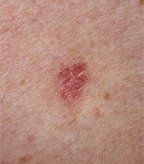New Skin Cancer Target Could Delay Drug Resistance
Using a novel combination, a new study suggests another way to inhibit the hedgehog signaling pathway to prevent or delay resistance to vismodegib in patients with basal cell carcinoma.
Using a novel combination, a new study suggests another way to inhibit the hedgehog signaling pathway to prevent or delay resistance to vismodegib (Erivedge) in patients with basal cell carcinoma, the most common form of skin cancer. An estimated 2.1 million new cases are diagnosed each year.
Vismodegib was approved in January 2012 for advanced basal cell carcinoma that cannot be treated with surgery or radiation. The drug targets the hedgehog pathway, which is upregulated in the majority of basal cell carcinoma cases and the driver of tumorigenesis.

Superficial basal cell carcinoma
“These new, highly targeted therapies work really well,” said Anthony E. Oro, MD, PhD, dermatology professor at Stanford University School of Medicine, who was part of the vismodegib development, in a press release. “But this type of treatment is a race against evolution. Within a year, many of the tumors recur when the cancers become resistant to the inhibitor.”
In the new study, published in the journal Nature, Oro and colleagues found that a combination of vismodegib with an inhibitor of atypical protein kinase C (aPKC) could prevent or delay drug resistance, as there are limits to the mechanisms by which tumors can escape drug treatment. Global gene expression experiments showed that both the membrane protein smoothened (SMO) and aPKC regulate a common set of genes.
Oro and colleagues used a targeted proteomics screen to identify potential downstream targets of the transcription factor that upregulates the hedgehog pathway. The target of vismodegib is SMO, but because the pathway continues to be turned on in tumors resistant to vismodegib, the researchers posited that other proteins are important to keep this pathway activated, downstream of SMO.
The screen identified, aPKC, and further experiments showed inhibiting the kinase prevented growth of vismodegib-resistant tumors in mice. The study also showed aPKC is overexpressed in the cells of basal cell carcinomas.
On their own, the weakness of targeted agents is the tumor’s eventual ability to bypass the inhibition by acquiring resistance. The study is an example of working toward a way to inhibit tumor growth by attacking cancer cells from different angles to debilitate the cell’s ability to acquire resistance to treatment.
Oro and colleagues are now working to optimize the aPKC inhibitor, as well as testing it in other cancers with an upregulated hedgehog pathway.